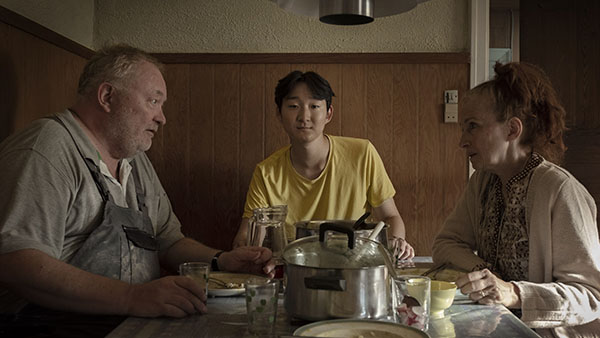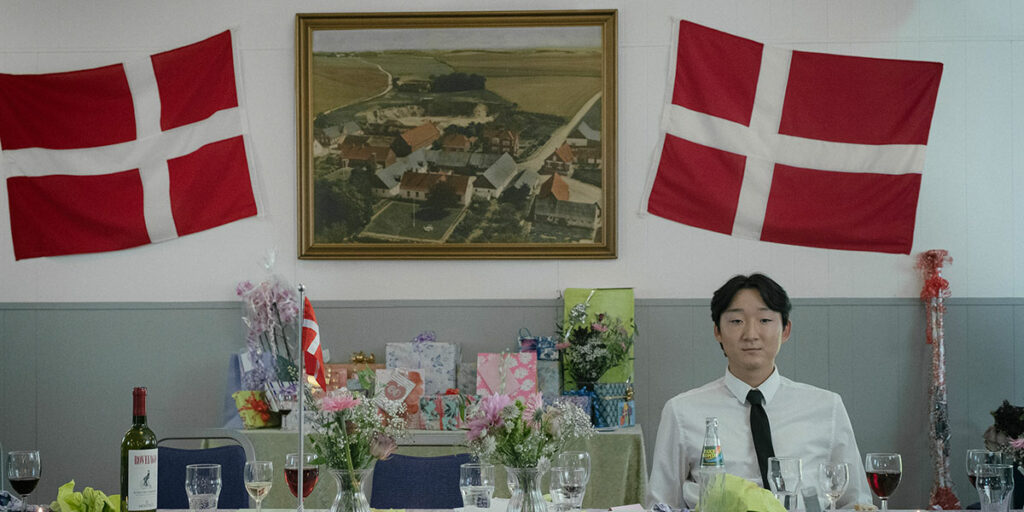Malene Choi’s The Quiet Migration (Stille Liv) is a personal and poignant film about a Korean adoptee’s search for identity and belonging in the Danish countryside.
The immigrant experience is often explored in film via the rush of moving to a new place, with an overwhelming influx of new spaces, languages and cultures to add a touch of drama. But Malene Choi’s The Quiet Migration sits somewhere a little different, focussing instead on transnational adoption and the search for understanding who you are outside of the culture you’ve been raised in. It’s peaceful, contemplative and much more interested in the complexities of feeling like you don’t belong and navigating spaces that should feel comfortable as an ‘outsider’ looking in.
Carl (Cornelius Won Riedel-Clausen) is a Korean adoptee living with his parents, Karen (Bodil Jørgensen) and Hans (Bjarne Henriksen), in rural Denmark. He’s just finished boarding school and is expected to one day take over the family farm. But Carl is stuck between two worlds, the one he knows in Denmark and the one he doesn’t in Korea, and soon Carl starts to question who he is and what he wants.
The Quiet Migration is a film that feels nostalgic, deeply personal and metaphorical all at once. Choi uses her own experiences as an adoptee to infuse Carl’s journey throughout the film with a really palpable sense of alienation, and the film feels all the more poignant for it.
There’s a sensitivity to the way in which Carl’s feelings of loneliness, confusion and ‘otherness’ are portrayed, emphasised by Riedel-Clausen’s subdued performance. In an impressive debut role, he captures that sense of existing between two cultures whilst not quite fully belonging to either really well, helped in part by his own experiences as a Korean adoptee. Carl is on the outside looking in, disconnected and struggling to reconcile his place both in the world and in his own family, and Riedel-Clausen is able to convey that alienation really effectively.

The titular ‘quiet migration’ is that of transnational adoptees, and Choi’s film visualises the silent struggle they face in trying to come to terms with all aspects of their identity. Carl’s life in Denmark is a simple one, but the ailing health of his parents, racist microaggressions from extended family members and a yearning for something more make it complicated.
The film also uses dream-like interludes to symbolise that feeling of being trapped between two cultures. Choi, and DOP Louise McLaughlin, overlay the cityscapes of Korea with the idyllic Danish countryside, and transport Carl to his homeland where he looks around in wonder at the high-rise buildings, the ‘exotic’ food and people who look just like him. It is perhaps the film’s most poignant scene, because it comes just as the tension between Carl and his parents – played wonderfully and authentically by Jørgensen and Henriksen – reaches a tipping point.
He’s questioning his future and whether he really does want to take over the farm, struggling to reconcile the aspects of his life that he doesn’t know or understand with the ones he does. And that, combined with his loneliness, is beginning to frustrate and upset him. Choi uses the meteor – which crashes into the opening sequence – as a metaphor for Carl’s conflicted feelings.
He knows it’s there, finds it deep in the ground, and then hides it away again under his bed. But he keeps looking at it, keeps poking at that place inside him that’s searching for something, and soon it’s causing the house to jolt and the walls to crack. It’s representative of the longing within Carl, of his desires to know more about himself and the culture he comes from, and the way it can cause destruction if ignored for too long. And then when Carl does get the chance to ‘visit’ Korea, he finds he doesn’t understand the language, nor does he really recognise this place as ‘home’, and that frustrates and upsets him too.
It’s a really powerful way of exploring identity. The Quiet Migration plays with imagination and simple, but highly effective, visual flourishes to explore the conflicting emotions of the transnational adoptee experience, of existing within two cultures and not feeling a sense of belonging to either one. Choi highlights the importance of communication and openness within blended families, but also the realities of how the experience of self-discovery can feel incredibly lonely and overwhelming at times. It’s a subtle and moving film that resonates deeply, even if you’ve never struggled with feeling like an outsider yourself.
The Quiet Migration (Stille Liv) premiered at the Berlin Film Festival on February 19-25, 2023. Read our Berlin Film Festival reviews!

